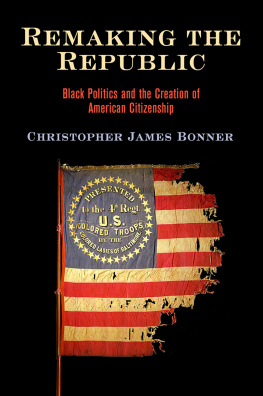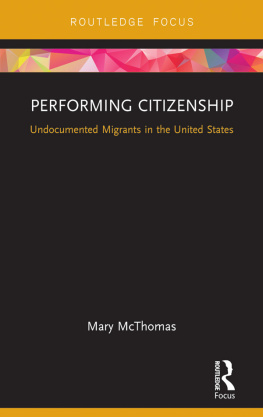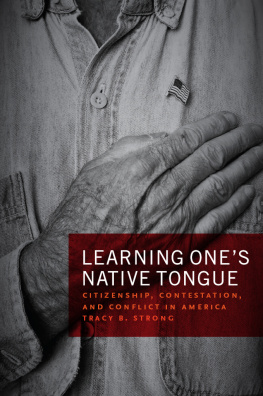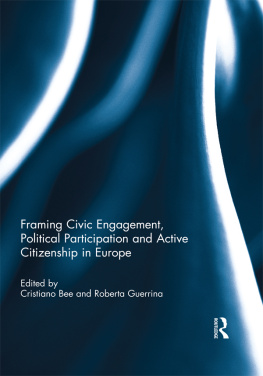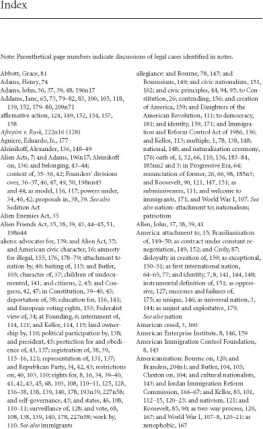A NEW AMERICAN CREED
THE ECLIPSE OF CITIZENSHIP AND RISE OF POPULISM
David H. Kamens
STANFORD UNIVERSITY PRESS
Stanford, California
Stanford University Press
Stanford, California
2019 by the Board of Trustees of the Leland Stanford Junior
University. All rights reserved.
No part of this book may be reproduced or transmitted in any form or by any means, electronic or mechanical, including photocopying and recording, or in any information storage or retrieval system without the prior written permission of Stanford University Press.
Printed in the United States of America on acid-free, archival-quality paper
Library of Congress Cataloging-in-Publication Data
Names: Kamens, David H., author.
Title: A new American creed : the eclipse of citizenship and rise of populism / David H. Kamens.
Description: Stanford, California : Stanford University Press, 2019. | Includes bibliographical references and index.
Identifiers: LCCN 2019005083 (print) | LCN 2019006599 (ebook) | ISBN 9781503609549 (e-book) | ISBN 9781503604964 (cloth; alk. paper) | ISBN 9781503609532 (pbk.; alk. paper)
Subjects: LCSH: Political cultureUnited States. | CitizenshipUnited States. | IndividualismUnited States. | PopulismUnited States. | Social changePolitical aspectsUnited States. | United StatesPolitics and government.
Classification: LCC JK1726 (ebook) | LCC JK1726 .K358 2019 (print) | DDC 320.56/620973dc23
LC record available at https://lccn.loc.gov/2019005083
Cover design: David Drummond
Typeset by Newgen in Sabon 10/15
Contents
Preface
This book is the result of many years of conversation with Ron Jepperson on American political development. We both lived through the 1960s as students and saw the start of an episode of democratization, as a wide variety of disenfranchised groups successfully challenged classic legal and social restrictions against them. These successes, however, were quickly followed by countermovements aimed at de-democratization. One sign of the latter was the wave of voter demobilization that occurred after the 1960s (Burnham, 1984). This was an anomaly, and a puzzle for political scientists, because it occurred simultaneously with rising popular education levels, which typically increase electoral participation. Declining participation seemed to be a sign that many people were ignoring conventional politics. Meanwhile, bitter conflict was surfacing in the political system. White Southerners were turning Republican in response to President Johnsons and the Democratic Partys stance on civil rights. Racial resentment among white working-class voters in the north was also surfacing. Their migration to the Republican Party was beginning and later became a stampede. And the Democratic coalition was crumbling. Clearly from the viewpoint of the 1950s, something had changed for the worst as society appeared to go from consensus to paralyzing conflicts around fundamental issues.
How to theorize this dramatic change became our challenge. We knew of significant research on many pieces of this puzzle, but neither sociology nor political science had convincing answers at the macro level of how such changes could come about so dramatically and quickly. Many of the contemporary arguments did not seem up to the scale of the problem. Not only were individuals changing, but organizations, communities, and the political system itself were undergoing reorganization. S. M. Lipsets (1996) argument comes closest to a satisfactory explanation. Lipset recognized that the changes were systemic and proposed an argument suited to the scale of the problem. It invoked the dramatic challenges that the Great Depression, World War II, and the Cold War posed for American exceptionalism. Lipset argued that in response to these developments, governing elites and their constituents suspended many of the tenets of classic American political culture. However, once American hegemony had revived a sense of normality in society, public support for these changes weakened. Classic American exceptionalism reemerged as a political response. I have built on this insight and have sought to show how the changes provoked by these developments in state and society led to the current political crisis.
This insight also led to the realization that these earlier crises had produced national responses that were deviations from the normal path of development that the American political system would have followedand major segments of society believed should have followedat the time. One of Ron Jeppersons particular contributions was the recognition that the 1930s were a collectivist moment in American history. Global crises and developments drove many of the changes in American politics. An ongoing crisis arose when, to cope with these shocks, elites introduced adaptations that challenged key narratives of American exceptionalism. Such deviations produced a dialectic in which the changes introduced, such as big government, became sources of conflict when normality reemerged. Important political factions then denounced these changes as un-American or socialist and demanded a return to small government and deregulated capitalism. Business groups, for example, considered the experiments of the 1930s a complete mistake. Similarly, ideological conservatives saw the developments in the 1960s as preludes to anarchy and disaster for society. Many joined the chorus crying for law and order. American society became divided between the pro-1960s factions and the anti-1960s ones.
American hegemony in the 1960s and early 1970s opened the door for these reactions to develop and flourish. Classic American responses to these changes began emerging in this period: anti-elitism, anti-intellectualism, and populism. People were angry at political elites and their allies. The South was in revolt against government intrusion. Many resented big government and the gains of minorities. These post-1960s developments were not new, but they were more extreme versions of classic American responses. How these responses developed and intensified is one of the central subjects of the book.
We also realized that given the scope of change in society, any explanation had to be one suited to the scale of the problem. Change had occurred at multiple levels: individual habits and attitudes changed; communities had undergone reconstruction; and society itself had changed. Big government, big science, and a big military were part of the new normality. Realization about the scale of the problem was slow in coming, in part because the literature was itself fragmented.
Yet, as we began to grapple with the scale of change, we also recognized that there had been a major shift in authority in society. Many institutions and norms suffered diminished authority or lost it. Citizenship was one but there were many others, including families, communities, ethnic/racial groups, and the nation-state itself. The responsibilities conventionally associated with the key role of citizen morphed into options for the liberated person (Janowitz, 1983). Military service, voting, and religious observance, for example, declined once they ceased to be the obligations of respectable citizens. Other facets of the traditional citizen rolelike local community participation and volunteer workalso became obsolescent or, at least, optional. How this happened is an important subject of the book.
As a result of these changes, American political culture evolved in an important way. The individual became framed as the key agent of society. Charisma shifted from institutions to persons in dramatic fashion. This new cultural framing of authority in society threatened to vitiate that of all elites in society. It also dramatically enhanced the power of public opinion in society. The authority of science, medicine, law, the media, the state, and education were all weakened by this change. Virulent anti-intellectualism gained legitimacy under this redefinition of authority in society, freeing populism from constraints, and providing justification for a growing public disdain of elites. These changes created new problems for democracy. How to curb the anarchy that enhanced individualism licenses is one. Another is the question of whether enhanced individualism can be the basis for a communal ethic and social solidarity? (Bell, 1973). I address both issues.
Next page

